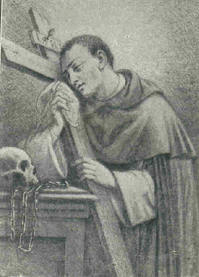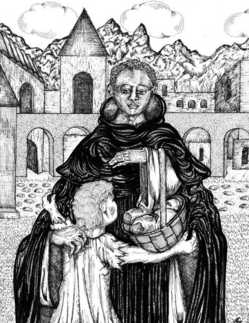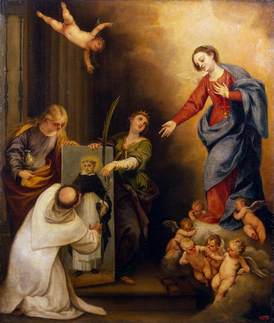Category: Dominican saints & blesseds
Saint Martin de Porres
Spiritual Maternity in Saint Catherine of Siena
‘Finish Your Life on the Cross’: Spiritual Motherhood in Saint Catherine of Siena’s Letters to Priests” by Sister Gabriella Yi, O.P was published in L’Osservatore Romano (August 12th-19th English edition). The author, Sister Gabriella Yi, O.P., is a member of the Congregation of St. Cecilia in Nashville, TN (also known as the Nashville Dominicans). A few times in the past I have posted some items on spiritual maternity and its necessity in the Church today, especially in the life of the priest.
At the foot of the cross, in the heart of the redemption, Our Lord Jesus Christ instituted a “new motherhood of Mary,” as he entrusted his mother to his beloved disciple and his beloved disciple to his mother. From this entrustment flows Our Lady’s spiritual motherhood of each member of Christ’s body, the Church, and especially her motherhood of his priests. Her maternal care for each priest was brought to our attention in a particular way by the Congregation for the Clergy’s teaching that, in union with Mary, all women are invited to live out their vocation to spiritual motherhood by offering their prayers and sacrifices for the salvation of souls and the holiness of Christ’s priests.
In his 1988 apostolic letter, Mulieris Dignitatem, Pope John Paul II speaks of motherhood and virginity as two important and related dimensions of a woman’s vocation. He describes how the vocation to motherhood is inscribed in the very being of a woman: she is not only physically but also psychologically endowed with the capacity to create a space within herself for another human being. John Paul speaks of this as a special “entrustment” that God has made to woman; she has the beautiful privilege of bringing forth new life into the world by the generous use of her feminine gifts.
Even those called to a life of consecrated virginity are not excluded from this vocation to motherhood. For them, John Paul says, there is the possibility of “a different kind of motherhood: a motherhood ‘according to the Spirit’. “In the life of consecrated women, this motherhood “can express itself as concern for people, especially the most needy….” John Paul is careful to point out that this concern for others on the part of consecrated women is motivated by spousal love for Christ. Just as natural motherhood is the fruit of the spousal love in marriage between husband and wife, spiritual motherhood is the fruit of the spousal love in religious life between the consecrated virgin and Christ.
What may come as a surprise to some is John Paul’s insistence that spiritual motherhood is not limited to unmarried women: “And does not physical motherhood also have to be a spiritual motherhood, in order to respond to the whole truth about the human being who is a unity of body and spirit?” John Paul II evidently sees it as an important dimension of every woman’s vocation.
The doctor of the Church who most clearly articulates this vocation to spiritual motherhood is the 14th century Dominican tertiary Saint Catherine of Siena, who is perhaps best known for the prayers, sacrifices, and counsel she offered Pope Gregory XI in his decision to return the papacy from Avignon to Rome. In looking to her as a model of spiritual motherhood for priests, we discover that Catherine teaches not only by the example of her prayers and sacrifices, but also by the counsel she offers in her letters: “See that in everything you turn to Mary as you embrace the cross,” “Make your home in the pulpit of the cross,” and “Finish your life on the cross,” encouraging her spiritual sons to identify themselves ever more closely with Christ the High Priest. Catherine’s spiritual motherhood, as seen in these letters, offers us a rich source of inspiration as we enter into this “Year for Priests.”
Catherine’s letters to priests often include words of encouragement in times of difficulty, as she writes to Blessed Raymond of Capua, referring to herself in the third person: “I’ve heard from a servant of God who constantly holds you before God in prayer, that you have been experiencing tremendous struggles and that your spirit has been overtaken by darkness because of the devil’s illusions and deceits.” With this image of holding a soul before God in prayer, as a mother holding her child out so that its Father might take it up into his arms, Catherine reveals the maternal quality of her prayer. With a mother’s intuition illumined by the Holy Spirit, she perceives the spiritual darkness he has fallen into and explains the enemy’s tactics: “He wants to make you see the crooked as straight and the straight as crooked, and he does this to make you stumble along the way so you won’t reach your goal.” In the face of such diabolical attempts to impede his priestly ministry, Catherine assures Raymond, “But take heart. God has provided and will continue to provide for you, and his providence will not fail you.” A priest’s confidence is to be placed, not in himself, where it is sure to fail, but in God’s providential care for him, especially in the form of his mother. As Our Lady’s maternal love for her son embraced him from the moment of his Incarnation to his death on the cross, so, too, does her maternal love embrace his priests in her constant intercession for them. Thus, they can entrust their priestly hearts wholly to hers, especially in times of discouragement, as Catherine advises, “See that in everything you turn to Mary as you embrace the cross.”
But it is not enough to embrace the cross-it must be mounted, as Catherine explains in her letter to Frate Bartolomeo Dominici: “After the fire of the Holy Spirit had descended on [the disciples], they mounted the pulpit of the blazing cross, where they felt and tasted the hunger of God’s Son, his love for humankind.” With this striking image, Catherine expresses the complete identification of Christ and his priests on the cross, blazing with the fire of divine charity, where they feel what he felt and taste what he tasted in his all-consuming love for us. Only from such a pulpit of divine charity do the words of priests wield supernatural power: “Then their words came forth as does a red-hot knife from a furnace, and with its heat they pierced their listeners to the heart and cast out the devils.” Indeed, many of Catherine’s own listeners were pierced to the heart, not only by her words, but also by those of the priests to whom she sent them in the pulpit of the confessional. Whether he is casting out devils in the confessional or at the altar, the pulpit of the cross is where the priest of Christ belongs, as Catherine implores, “So, my dearest son, I beg you-it is my will in Christ Jesus-make your home in the pulpit of the cross.”
From this pulpit, a priest of Jesus Christ engages in a battle for souls, beginning with his own, which is why in her letter to Frate Ranieri Catherine urges, “I long to see you a real knight, fighting against every vice and temptation for Christ crucified with a true holy perseverance.” With such chivalric imagery, she appeals to his masculine instincts for battle and adventure, as she continues, “For it is perseverance that is crowned. You know that victory is achieved by fighting and perseverance. In this life we are set as on a battlefield and we must fight courageously, not dodging the blows or retreating, but keeping our eyes on our captain, Christ crucified, who always persevered.” Just as no soldier goes into battle at his own initiative, but solely at that of his captain, so too must a priest take his commands from Christ, who:
. . . didn’t give up when the Jews said, ‘Come down from the cross!’ Nor did the devil or our ingratitude make him give up fulfilling the Father’s command and our salvation. No, he persevered right up to the end, when he returned to the eternal Father with the victory he had achieved, the victory of having rescued humankind from darkness and given us the light of grace once again by conquering the devil and the world with all its pleasures. And it killed him: this Lamb took death for himself in order to give us life; by his dying he destroyed our death.
Finally, as no soldier dies for an abstraction he holds, but for a beauty he loves, so too must Christ’s priests live and die for love of the beauty of his bride, the Church. Hence, Catherine concludes her letter to this priest simply with, “Finish your life on the cross.”
In these letters to Blessed Raymond of Capua and other priests, the voice of Saint Catherine of Siena as a spiritual mother is unmistakable. The authority with which she speaks is that of one whose spousal love for Christ united her so closely to him that his desire for the salvation of souls and the holiness of his priests has become her very own. As Catherine joins “that gentle mother Mary” in interceding for Christ’s priests, she invites us to do the same. In light of the Congregation for the Clergy’s document calling for spiritual mothers for priests and Pope Benedict XVI’s dedication of the current year as a “Year for Priests,” a rediscovery of this spiritual mother’s letters to priests could not be more timely.
Blessed Benvenuta Bojani
Lord, you gave Blessed Benvenuta the gifts of penance, prayer and humility. Through self-denial and contemplation on heavenly things may we too live in the Spirit and find rest and glory in you, the one God.
Saint Dominic de Guzman
Preach we now the Word of life,
Not with show of worldly learning,
But with fervor of our faith
Open hearts to Spirit’s yearning.
Christ alone be ever knowing,
And Him crucified be showing.
Dominic, called by the Lord,
Preaching, teaching, daily blessing,
Living poor and common life,
Contemplation’s fruit expressing;
Thus he formed his Preachers boldly,
Showing graces manifoldly.
God the blessed Three in One,
Love beyond all human telling,
Father, Son, and Spirit blest,
Throned in heav’n and with us dwelling,
With the Word of Truth now feed us,
In Your holy ways now lead us.
78 78 88
suggested tune: Liebster Jesu
James Michael Thompson, (c) 2009, World Library Publications
Saint Catherine of Siena
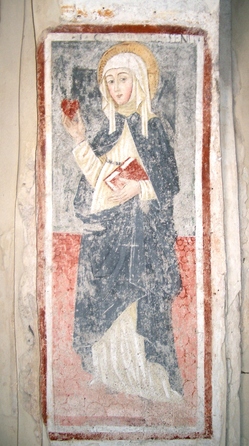 The Kingdom of heaven is like a merchant seeking good pearls, who, when he had found one of great price, gave all that he had and bought it, alleluia.
The Kingdom of heaven is like a merchant seeking good pearls, who, when he had found one of great price, gave all that he had and bought it, alleluia.
Blessed Fra Angelico
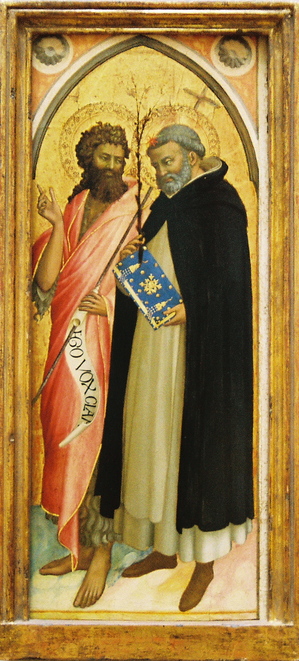 Known in the Dominicans as Brother John from
Known in the Dominicans as Brother John from
In declaring Fra Angelico the Patron of Catholic Artists in 1982, Pope John Paul II said: “Angelico was reported to say “He who does Christ’s work must stay with Christ always”. This motto earned him the epithet “Blessed Angelico”, because of the perfect integrity of his life and the almost divine beauty of the images he painted, to a superlative extent those of the Blessed Virgin Mary.”
Fra Angelico’s grave stone in the Dominican Church of Santa Maria sopra Minerva (
When singing my praise, don’t liken my talents to those of Apelles. Say, rather, that, in the name of Christ, I gave all I had to the poor. The deeds that count on Earth are not the ones that count in Heaven. I, Giovanni, am the flower of
When in
Blessed Jordan of Saxony
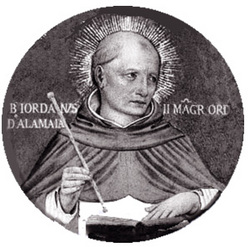 It has been said that “Jordan who, more than any one man after Saint Dominic himself, created the spirit of the Order, gave to it a joy and an informality in its daily life which are amongst its greatest treasures, for they enshrine and express a whole theology of religious life.”
It has been said that “Jordan who, more than any one man after Saint Dominic himself, created the spirit of the Order, gave to it a joy and an informality in its daily life which are amongst its greatest treasures, for they enshrine and express a whole theology of religious life.”
May Blessed Jordan of Saxony pray for the Order of Preachers today and always, and grant an increase of vocations to the Dominican Family. May he stir up the hearts of young men and women, as once he did on this earth, with a fervour for Truth, to give themselves in its service in the Order of Preachers. May he clothe us, his brothers and sisters, with his zeal and passion for Christ the Word, and may he give us cause joyfully to laugh in his company for ever. Amen.
Saint Thomas Aquinas
The Lord led the just in the right paths. And showed him the kingdom of God.
O God, Who does enlighten Thy Church by the wonderful learning of blessed Thomas, Thy Confessor, and makes it fruitful by his holy works; we beseech Thee, grant us both to understand what he taught and to follow his example in what he practiced.
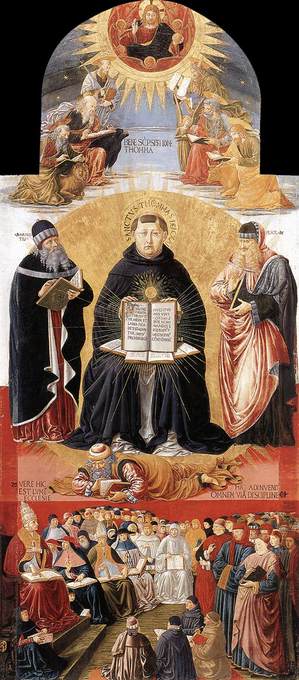 “The law of divine love is the standard for all human actions”
“The law of divine love is the standard for all human actions”
It is evident that not all are able to labor at learning and for that reason Christ has given a short law. Everyone can know this law and no one may be excused from observing it because of ignorance. This is the law of divine love. As scripture says, The Lord will quickly execute sentence upon the earth.
This law should be the standard for all human actions. In the case of products of human manufacture, each product is considered right and good when it conforms to a standard. So also each human act is considered right and virtuous when it conforms to the standard of divine love. But when a human act does not conform to the standard of love, then it is not right, nor good, nor perfect.
This law of divine love accomplishes in a person four things that are much to be desired. First, it is the cause of one’s spiritual life. For it is evident that by the very nature of the action what is loved is in the one who loves. Therefore whoever loves God possesses God in himself; for scripture says, Whoever remains in love remains in God and God in him. It is the nature of love to transform the lover into the object loved. And so if we love God, we ourselves become divinized; for again, Whoever is joined to God becomes one spirit with him. Augustine adds, “As the soul is the life of the body, so God is the life of the soul.” Thus the soul acts virtuously and perfectly when she acts through charity, and through charity God lives in her; indeed, without charity she cannot act; for scripture says, Whoever does not love, remains in death. If a person possesses all the gifts of the Holy Spirit, but lacks charity, that person has no life. For it matters not whether one has the grace of tongues, or the gift of faith, or any other gift such as prophecy; these do not bring life without charity. Even if a dead body should be adorned with gold and precious jewels, it nevertheless remains dead.
The second point about charity is that it leads to the observance of the divine commandments. Gregory the Great says that charity is not idle. For charity is present if one is occupied about great things; but if one is not so occupied, charity is not present. We see a lover do great and difficult things because of the one loved, and that is why the Lord says, Whoever loves me will keep my word. Whoever keeps this command and the law of divine love fulfills the whole law. A third point about charity is that it provides protection against adversity. For misfortune cannot harm one who has charity; rather it becomes useful to that person; as scripture says, All things work for good for those who love God. Furthermore, misfortune and difficulties seem pleasant to the lover, and our own experience verifies this.
A fourth point about charity is that it truly leads to happiness, since eternal blessedness is promised only to those who have charity. For all other things are insufficient without charity. You must note that it is only the different degrees of charity, and not those of any other virtues, which constitute the different degrees of blessedness. Many of the saints were more abstemious than the apostles, but the apostles excel all the other saints in blessedness because of their higher degree of charity.
From a conference by “St. Thomas Aquinas” (Opuscula, In duo praecenta… Ed. J.P. Torrel, in Revue des Sc. Phil. Et Théol., 69, 1985, pp. 26-29.
Saint Thomas Aquinas by Joseph Pieper
Saint Thomas Aquinas by Father Bernhard Thomas Blankenhorn, OP
Various stimulating resources on Aquinas
Saint Martin de Porres
Blessed Pope John XXIII said of Saint Martin de Porres:
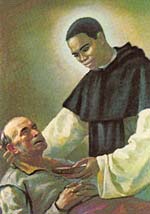 Saint Martin, always obedient and inspired by his divine teacher, dealt with his brothers and with that profound love which comes from pure faith and humility of spirit. He loved men and because he honestly looked on them as God’s children and as his own brothers and sisters. Such was his humility that he loved them even more than himself, and considered them to be better and more righteous than he was.
Saint Martin, always obedient and inspired by his divine teacher, dealt with his brothers and with that profound love which comes from pure faith and humility of spirit. He loved men and because he honestly looked on them as God’s children and as his own brothers and sisters. Such was his humility that he loved them even more than himself, and considered them to be better and more righteous than he was.
He did not blame others for their shortcomings. Certain that he deserved more severe punishment for his sins than others did, he would overlook their worst offenses. He was tireless in his efforts to reform the criminal, and he would sit up with the sick to bring them comfort. For the poor he would provide food, clothing and medicine. He did all he could to care for poor farmhands, blacks, and mulattoes who were looked down upon as slaves, the dregs of society in their time. Common people responded by calling him, “Martin the charitable.”
He excused the faults of others. He forgave the bitterest injuries, convinced that he deserved much severer punishments on account of his own sins. He tried with all his might to redeem the guilty; lovingly he comforted the sick; he provided food, clothing and medicine for the poor; he helped, as best he could, farm laborers and Negroes, as well as mulattoes, who were looked upon at that time as akin to slaves: thus he deserved to be called by the name the people gave him: ‘Martin of Charity.’
A good overview of Saint Martin’s life can be read here.
O God, the rewarder of the humble, you raised up the blessed confessor Martin to the kingdom of heaven. May his merits and prayers help us to imitate his humility on earth that we may be exalted with him in heaven.
